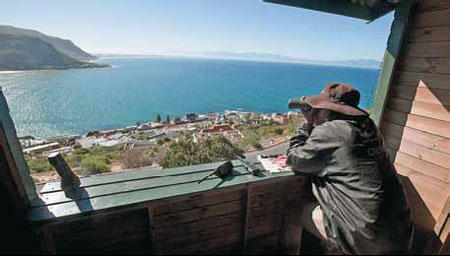Shark Spotters to the rescue
Updated: 2012-06-20 08:07
By Justine Gerardy in Cape Town, South Africa (China Daily)
|
|||||||||||
|
Shark spotter Tino Simmerie, 22, keeps watch over popular Fish Hoek beach, about 30 kilometers from Cape Town, South Africa, on May 15. Armed with a walkie-talkie, binoculars and polarized sunglasses, he is part of the pioneering program Shark Spotters, which began in 2004 following a spate of shark bites and sightings in the area. Rodger Bosch / Agence France-Presse |
Undetected on the mountain slope, Tino Simmerie sweeps his binoculars over the South African bay where bathers happily splash about in turquoise waters.
"They don't have a clue what's going on, basically," he said, staring out at the popular Fish Hoek beach, where he once saw a shark come up to the shore.
"We never know for sure when a shark is going to come into this bay. That's why we're up here every day - to just keep an eye out."
Armed with a walkie-talkie, binoculars and polarized sunglasses to protect against the harsh ocean glare, the 22-year-old is part of Cape Town's frontline against the Great Whites sharing its seas.
The pioneering program Shark Spotters started in 2004 following a spate of bites and sightings. Human lookouts were placed at busy beaches to give the alert for the sea to be cleared if they saw fins moving in.
South Africa records fewer attacks than other shark hotspots, such as Australia and the United States.
But the fatality rate is high: South Africa accounts for one-third of the 24 deaths worldwide on the International Shark Attack File for the past three years, despite local bites making up less than 10 percent of all attacks.
The latest victim was a young Cape Town bodyboarder, who died on April 19 after his leg was bitten off at a remote surfing spot. The attack followed a near-fatal mauling in September across the bay at top swimming site Fish Hoek.
Attacks in the age of Twitter have sparked alerts of "dinosaur huge" killers as tweeted by a witness to a 2010 death on Fish Hoek and fierce debate over theories of why bites are on the increase.
"You can understand it's a very emotional issue, especially for the people who have witnessed shark attacks," said Sarah Titley, Shark Spotters project manager.
"Being eaten by a very large fish is a very scary unknown that makes people react in a completely disproportionate way to what the actual sense of risk is. You've got a one in 253 million chance of being killed by a shark.
"So the risk is very small but it's such a traumatic event for people and it really does cause a lot of hype and hysteria."
No desire to kill sharks
To counter some of the fears, an exclusion net is on the cards for Fish Hoek, to add another layer to the city's prevention buffers. The attack seven months ago heightened its deadly reputation on the back of two deaths since 2004.
"It's a series of fixed nets which are very small diameter mesh so that nothing can swim through it," said Cape Town alderman Felicity Purchase.
"We needed to find something that would be practical, that would not cause damage. We don't want to kill the sharks, and we don't want to damage the other marine life that comes through."
Shark nets are controversial and were ruled out years ago, but officials say they need to tackle the damaging economic fallout and that the square-inch-sized mesh technology is successfully used in Hong Kong and the Seychelles.
"This will provide a safe area for parents who are worried about their children particularly, and for the elderly, who are not so fast getting out of the water," said Purchase, adding that two nets will cost 750,000 rand ($93,000).
"This will certainly prevent shark attacks in an area which allows considerable swimming space for our bathers. So I believe it could actually be the end of shark attacks."
Reaching up to six meters in length and two tons in weight, Great Whites are protected in South Africa.
They regularly prowl inshore during summer while tracking game fish and have a key winter feeding site at Seal Island in the giant False Bay, which is a global Great White hotspot.
The city, therefore, accepts that attacks are a possibility with a population of 3.5 million people sharing its 307 kilometers of beautiful coastline.
Spotters are on permanent watch at four beaches, and at six during summer, using a simple but effective system of flags and sirens between the lookout and a beach-based controller.
Not everyone listens to the spotters. A British man lost part of his legs last year after ignoring the fact that Fish Hoek beach was closed.
Despite the increased sightings and attacks, the experts say no rogue man-eater with a taste for human flesh is lurking about Cape Town's seas, where more nutritious prey swim.
"Since the program began in 2004, we've had over 1,200 shark sightings," said Titley.
"People report sharks just swimming straight past them, so if sharks really did want to eat people, we would be suffering a lot more attacks than we do," she added.
Agence France-Presse
(China Daily 06/20/2012 page10)
Today's Top News
President Xi confident in recovery from quake
H7N9 update: 104 cases, 21 deaths
Telecom workers restore links
Coal mine blast kills 18 in Jilin
Intl scholarship puts China on the map
More bird flu patients discharged
Gold loses sheen, but still a safe bet
US 'turns blind eye to human rights'
Hot Topics
Lunar probe , China growth forecasts, Emission rules get tougher, China seen through 'colored lens', International board,
Editor's Picks

|

|

|

|

|

|






